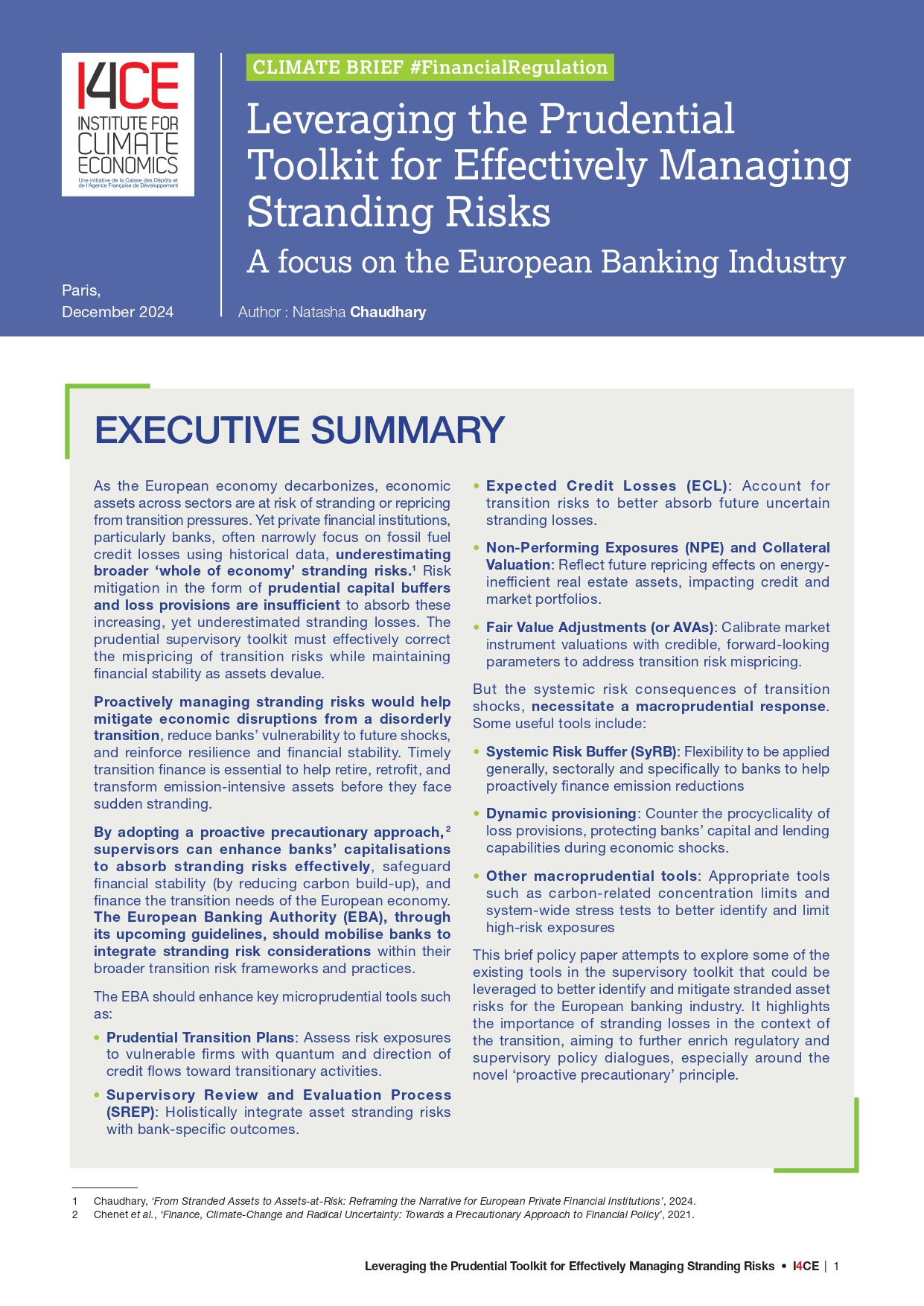Leveraging the Prudential Toolkit for Effectively Managing Stranding Risks: A focus on the European Banking Industry
As the European economy decarbonizes, economic assets across sectors are at risk of stranding or repricing from transition pressures. Yet private financial institutions, particularly banks, often narrowly focus on fossil fuel credit losses using historical data, underestimating broader ‘whole of economy’ stranding risks. Risk mitigation in the form of prudential capital buffers and loss provisions are insufficient to absorb these increasing, yet underestimated stranding losses. The prudential supervisory toolkit must effectively correct the mispricing of transition risks while maintaining financial stability as assets devalue.
Proactively managing stranding risks would help mitigate economic disruptions from a disorderly transition, reduce banks’ vulnerability to future shocks, and reinforce resilience and financial stability. Timely transition finance is essential to help retire, retrofit, and transform emission-intensive assets before they face sudden stranding.
By adopting a proactive precautionary approach, supervisors can enhance banks’ capitalisations to absorb stranding risks effectively, safeguard financial stability (by reducing carbon build-up), and finance the transition needs of the European economy. The European Banking Authority (EBA), through its upcoming guidelines, should mobilise banks to integrate stranding risk considerations within their broader transition risk frameworks and practices.
The EBA should enhance key microprudential tools such as:
- Prudential Transition Plans: Assess risk exposures to vulnerable firms with quantum and direction of credit flows toward transitionary activities.
- Supervisory Review and Evaluation Process (SREP): Holistically integrate asset stranding risks with bank-specific outcomes.
- Expected Credit Losses (ECL): Account for transition risks to better absorb future uncertain stranding losses.
- Non-Performing Exposures (NPE) and Collateral Valuation: Reflect future repricing effects on energy-inefficient real estate assets, impacting credit and market portfolios.
- Fair Value Adjustments (or AVAs): Calibrate market instrument valuations with credible, forward-looking parameters to address transition risk mispricing.
But the systemic risk consequences of transition shocks, necessitate a macroprudential response. Some useful tools include:
- Systemic Risk Buffer (SyRB): Flexibility to be applied generally, sectorally and specifically to banks to help proactively finance emission reductions
- Dynamic provisioning: Counter the procyclicality of loss provisions, protecting banks’ capital and lending capabilities during economic shocks.
- Other macroprudential tools: Appropriate tools such as carbon-related concentration limits and system-wide stress tests to better identify and limit high-risk exposures
This brief policy paper attempts to explore some of the existing tools in the supervisory toolkit that could be leveraged to better identify and mitigate stranded asset risks for the European banking industry. It highlights the importance of stranding losses in the context of the transition, aiming to further enrich regulatory and supervisory policy dialogues, especially around the novel ‘proactive precautionary’ principle.
It’s time to reframe the way private financial institutions think about stranded assets.
In this video, I4CE highlights the limitations of the current narrow approach used by private financial institutions (FIs) to capture stranded asset risk in their portfolios. We argue for a ‘whole of economy’ lens with a proactive approach to better identify and mitigate stranding losses on ‘assets-at-risk’. Financial regulators and supervisors must leverage their toolkit to encourage FIs to proactively manage stranding risks.

